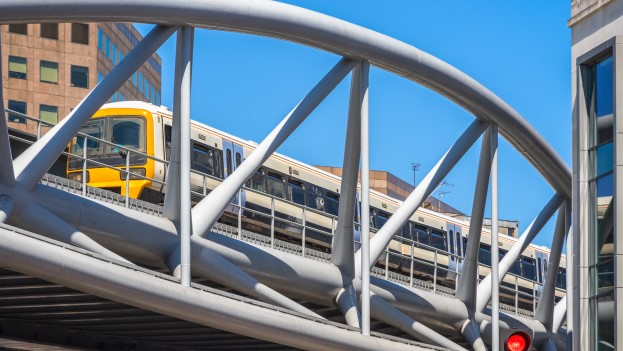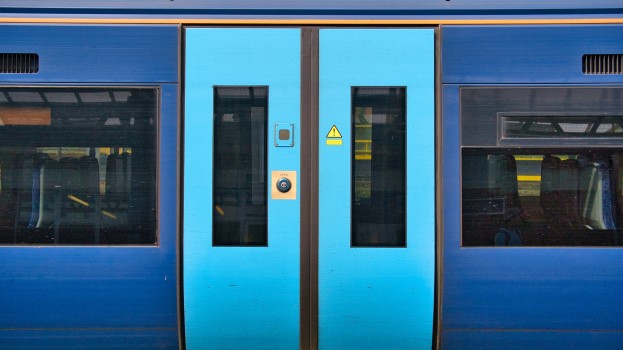Our reporting analyst Helen caught up with Benjamin Stephens, occupational safety delivery manager at Southeastern, to discuss a CIRAS report that the company received and how it links to its fair culture approach.
The concern was about dispatch processes not being followed and staff not feeling they could speak up about safety concerns. It led to the company taking several actions, set out below.

Above: a Southeastern train in London
The reporter’s concern
When the reporter raised the concern with CIRAS, they told us the company’s procedure for safe dispatch was being followed inconsistently at a railway station. On several occasions, staff were taking shortcuts when carrying out dispatch duties.
These shortcuts included:
- Staff were not in the correct position for dispatch, which could lead to a platform-train interface incident (PTI) (an incident involving a passenger on the platform or while boarding or alighting a train).
- Staff were using an umbrella while dispatching a train.
- Too few dispatch staff were on the platform to dispatch a train, for example three people were there rather than four when dispatching a 12-carriage train.
The reporter commented: ‘Safety isn’t looked on highly, yet it’s a safety-critical role.’
Underlying cause
Reporter’s view: They did not believe the root cause was down to rostering but rather ‘staff complacency’ around the dispatch procedure. ‘They just seem to believe that it's fine to do it with less than the minimum number, because they've done it before.’
Company’s view: The company viewed the root cause as similar, acknowledging that staff can act differently under assessment compared to every day.
Response
The response from Southeastern had many of the factors we like to see in a response: a genuine tone, validation of the reporter’s concerns, and acknowledgment of an issue with actions taken to mitigate the risks raised.
As a result of the report, the company took several actions:
- Going forward, they will monitor staff unobtrusively, which will be repeated at regular intervals/times.
- They sent a reminder to all dispatch locations, to refresh awareness that enough staff must be present and in the correct positions to dispatch trains, in accordance with local instructions.
- They reminded staff at all locations not to dispatch while using umbrellas.
- The operations competence specialist for the area will work more closely with the health and safety rep.
- A PTI briefing reminded staff of the use and importance of commentary dispatch and the Rail Safety and Standard’s Board (RSSB) Rule Book requirements to reduce the risks and likelihood of incidents.
- They reminded staff that safety concerns should be reported as soon as possible, and that their local operations competence specialist can provide support and guidance.
Setting the report in the context of Southeastern’s Fair Culture Charter
When discussing the report and response with Benjamin, I learned how the response fitted with the company’s Fair Culture Charter, which launched in November 2022 after much work and research.
Discussing the Charter’s background, Benjamin said, ‘It's been trialled for a few years – originally with drivers – experimenting how we investigate accidents/incidents, and it’s taken quite a lot of time to get it right.’
The Charter provides the foundation for learning reviews after safety incidents and accidents. It encourages a holistic view, setting the issue within the context of the wider picture to really find the root causes, and looking at where support could reduce the risk of an incident happening again, rather than someone feeling blamed for doing something.
‘We understand that people don’t go to work to do a bad job,’ said Benjamin.
The response demonstrates the fair culture approach in carrying out unobtrusive monitoring of staff, not singling any individuals out, and acknowledging where processes may not be happening at a local level. For example, part of the concern was that the reporter did not feel that safety reporting was encouraged or easily facilitated, and the response acknowledged that this appeared to be the case.
‘Through discussion and observation, it was clear that the team leaders are not always available on the platforms in support of the teams,’ Benjamin said. Southeastern took action to improve this, as seen in this part of its response:
Remind staff that concerns about safety should be reported as soon as possible and that their local operations competence specialist can also provide support and guidance.
Benjamin shared that prior to fair culture, the response may have been different. It could have been more accusatory, such as singling someone out and asking them why they are doing something wrong, but now investigation happens through conversation rather than interview and by ‘making it a more comfortable session, talking through why that mistake was made’ and then learning from that.
Excellent listening
At CIRAS, we are passionate about excellent listening, and we encourage our members to ‘listen’ well when receiving a CIRAS report. We want our members to know that a report should not be seen as a complaint or something negative, but rather the opportunity to gain helpful intelligence from those on the frontline. Many health and safety professionals would agree that the best insight comes from those dealing with the risks daily.
Southeastern’s response to this dispatching concern shows this. We asked Benjamin what demonstrates good listening when it comes to responding to employee concerns. Here are some of his comments:
‘Active listening, actually understanding what they’re saying.’
‘Testing out what is being said.’
He emphasised that it was important to value the fact someone had taken time to raise a concern, and that this included responding to concerns in a timely manner.
‘Every report is important, and it needs to be treated as such.
‘We make sure it’s sent to the correct department, that we act on it straight away. It’s really important to keep that trust with the employees, for people to see action has been taken, that feedback has been taken on-board. It shows the company is engaged.’
A willingness to learn is key, as the response shows. Benjamin sums up the company’s approach to listening to staff as follows.
‘A lot of the recommendations come from the staff themselves. You sort of feed it out of those conversations. We’re all part of the same team, with the same outcome, same goals. They’re the people on the ground, they know best. They know where the holes are.’
Shared learning
With every report we send, we give the responding company an opportunity to summarise anything learned in the process of responding to the report. Southeastern’s comment here was, ‘At times, staff act differently under assessment compared to when safety professionals are around.’
We asked Benjamin why he thinks this is, and what he thinks is the best approach to change behaviour. ‘Good question. I used to be a competency assessor. It’s very true – you go out one day, they know you’re there, it goes well, all fantastic, and then the next day it might be the opposite.
‘It’s a small percentage of people who do that, definitely the minority, perhaps because they think that what they do is right. It’s difficult to label its reason.’
One reason he suggested was that over time a task may begin to seem monotonous to someone, and this might result in slipping into a bad habit. With the report topic, dispatching a train, he said a complacent approach to that ‘doesn’t just happen, it happens over time’.
‘A lot of it is just reminders,’ Benjamin adds, ‘with people realising “we are being monitored and looked at” they’re more likely to follow processes.’
As mentioned in the report response, supervisors and team leaders will not always be in the same area as their reports.
‘A hindrance in big stations can be that supervisors or team leaders can be in other parts of a station as they have other parts to their role.’
Internal reporting and benefits of CIRAS reporting
There is sometimes a misconception among our members that someone raising a concern must have first raised it internally, but CIRAS can be used to report something for the first time. Discussing the benefits of CIRAS reporting, Benjamin said, ‘I think it’s good because some people don’t like talking to people, they can be quite introverted, so this provides another way to report.’
We also discussed that some people come to CIRAS after raising a concern internally. In these instances, where perhaps no progress has been made, reporting through CIRAS ‘brings it to the forefront’.
‘CIRAS reports are in our board meetings each month. It’s seen then by our managing director, and he might say, “Why’s this happening?” It highlights it to the wider business, so people know it’s an actual issue,’ Benjamin said.
‘Bringing that visibility, so we can track it, it’s important to have it as another means of reporting.’
Final thoughts
For a final question, we asked Benjamin what his biggest takeaway was from the report. He said, ‘The fact that Southeastern has actually used this fair culture approach.
‘They’ve taken the right look, the right view, used the information as guidance to get a good outcome…It’s nice to see and we want to build on it.’
So far in 2022/23, 4% of CIRAS reports have been about dispatch.

Find out more
Talking reports: looking for the 'why' with Rail for London Infrastructure
Tags
- Rules and Procedure
- Train Operating Company

